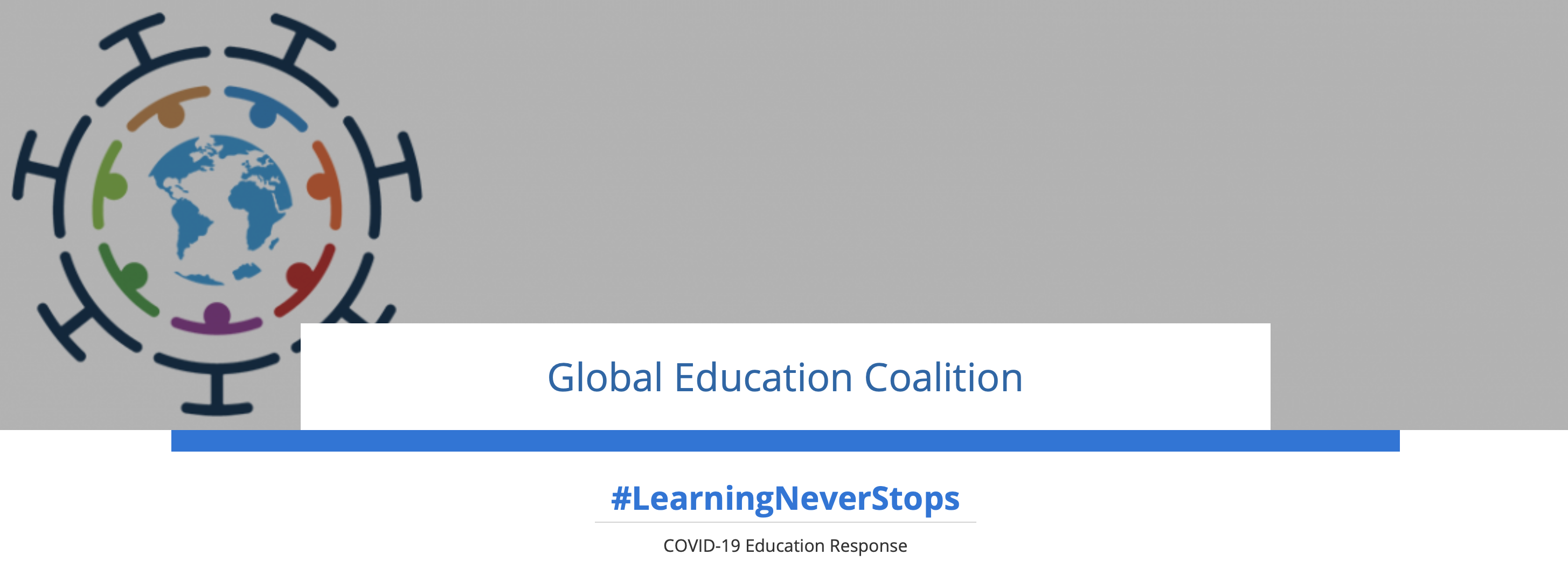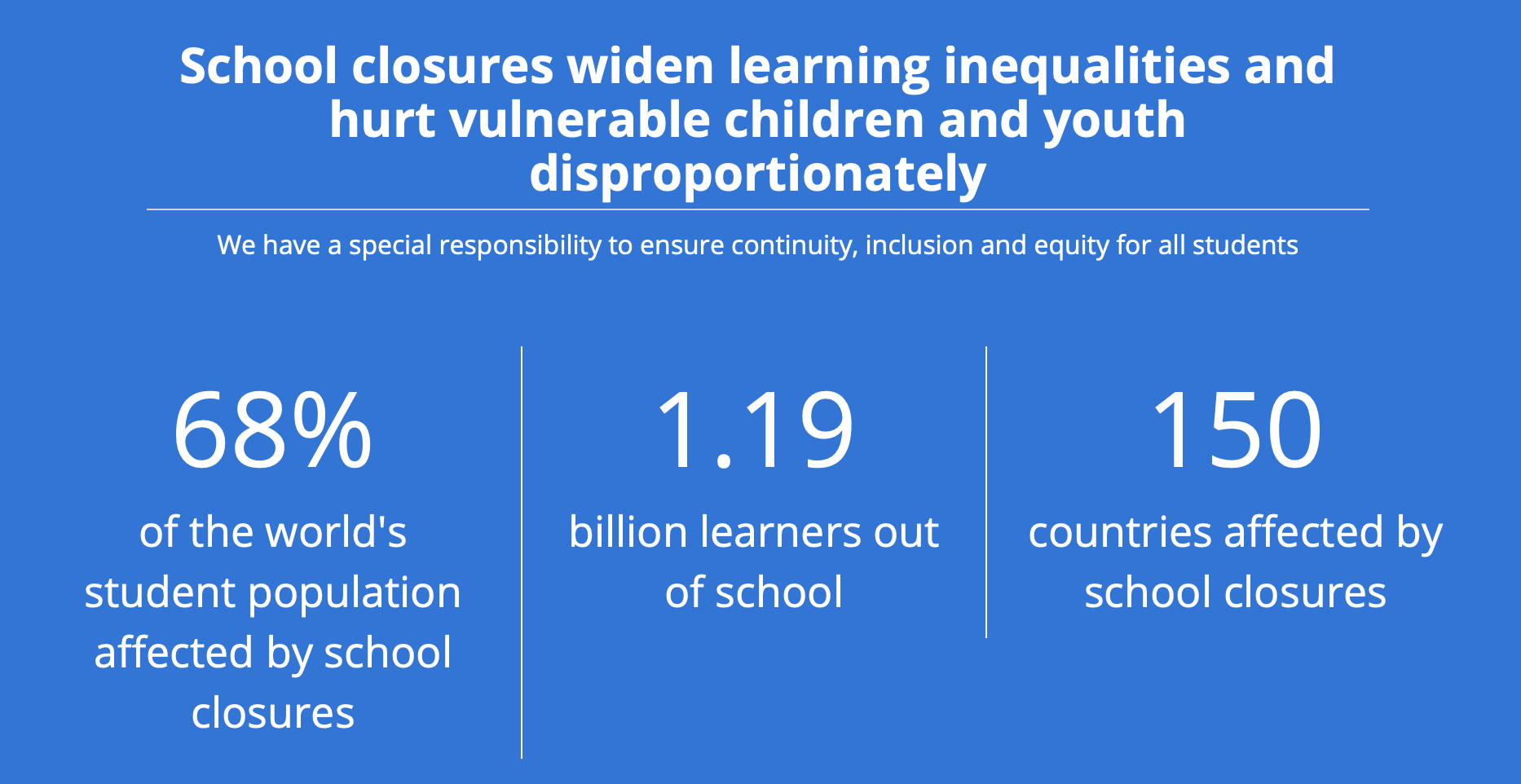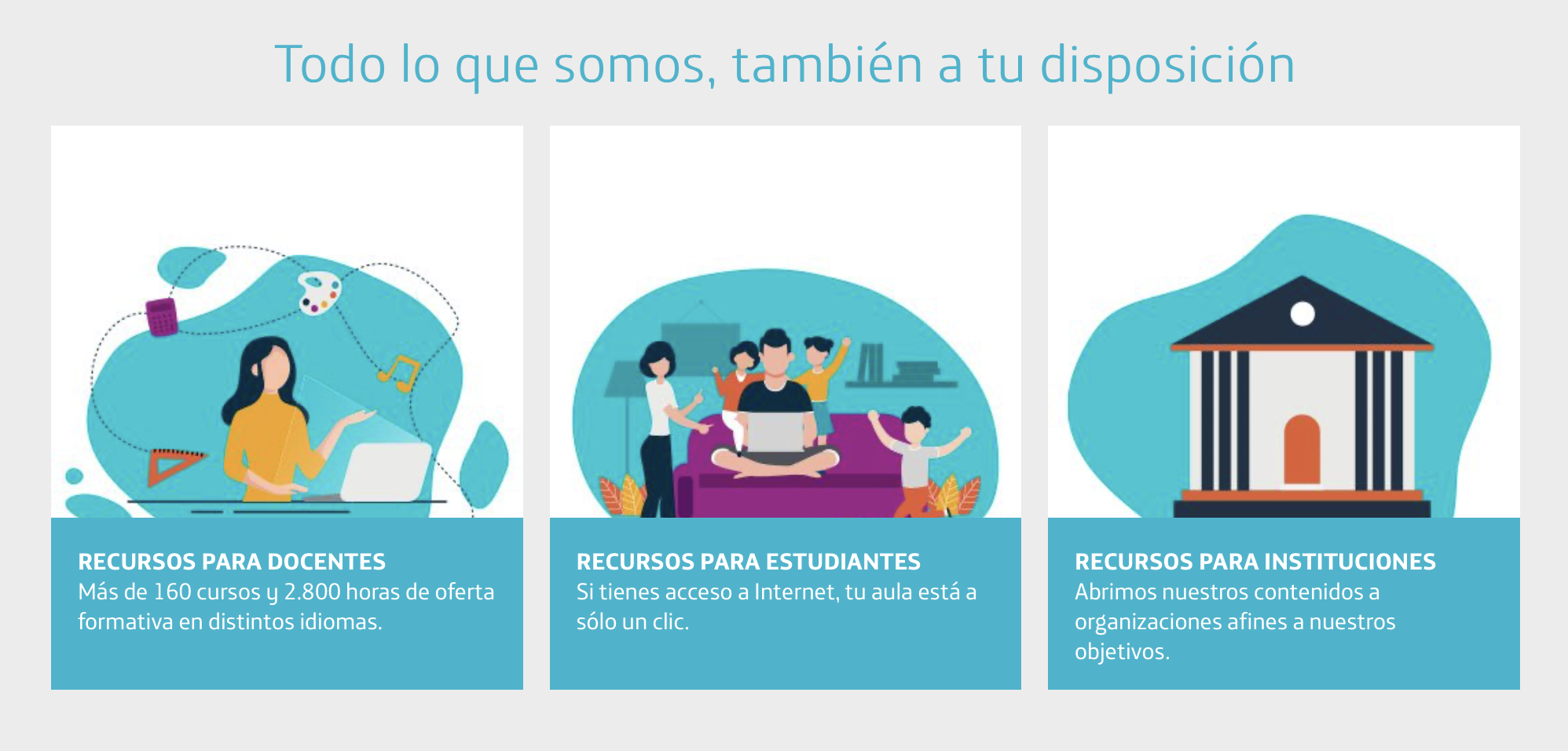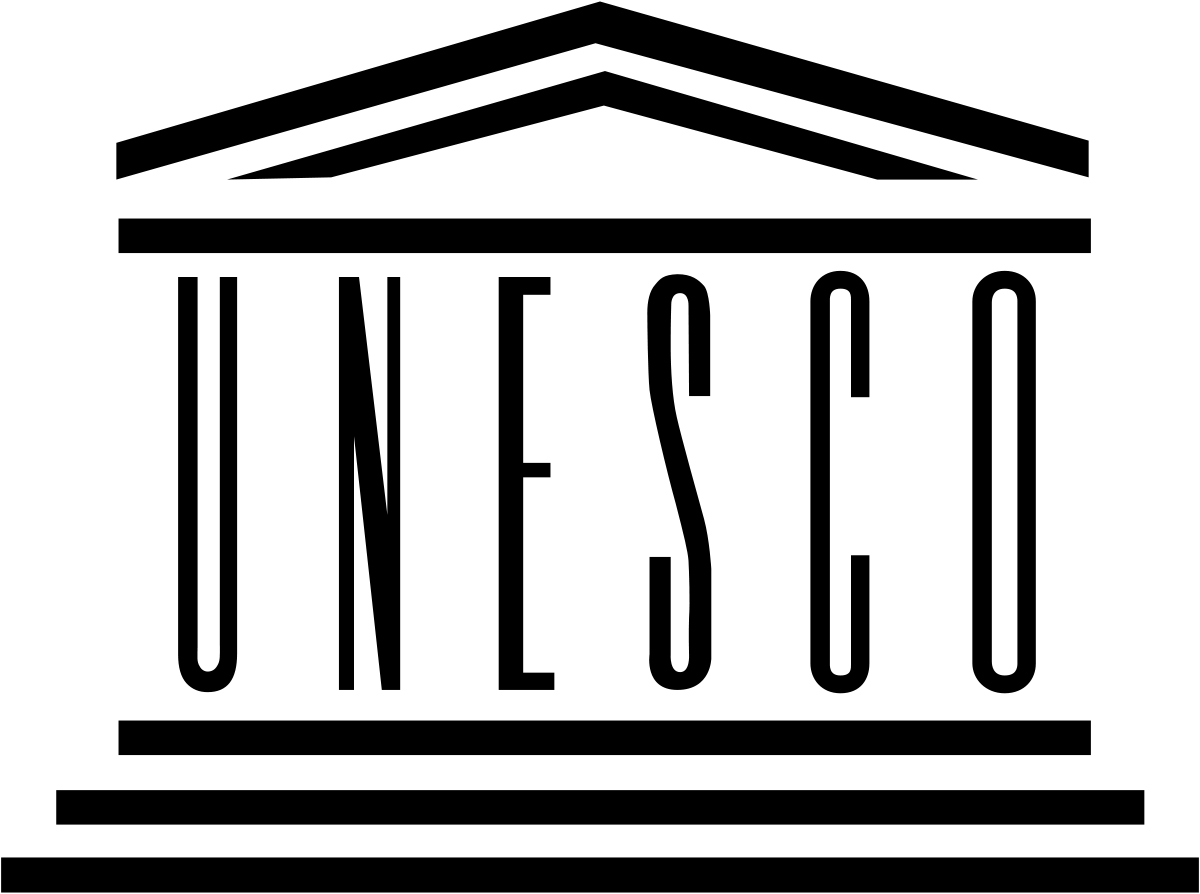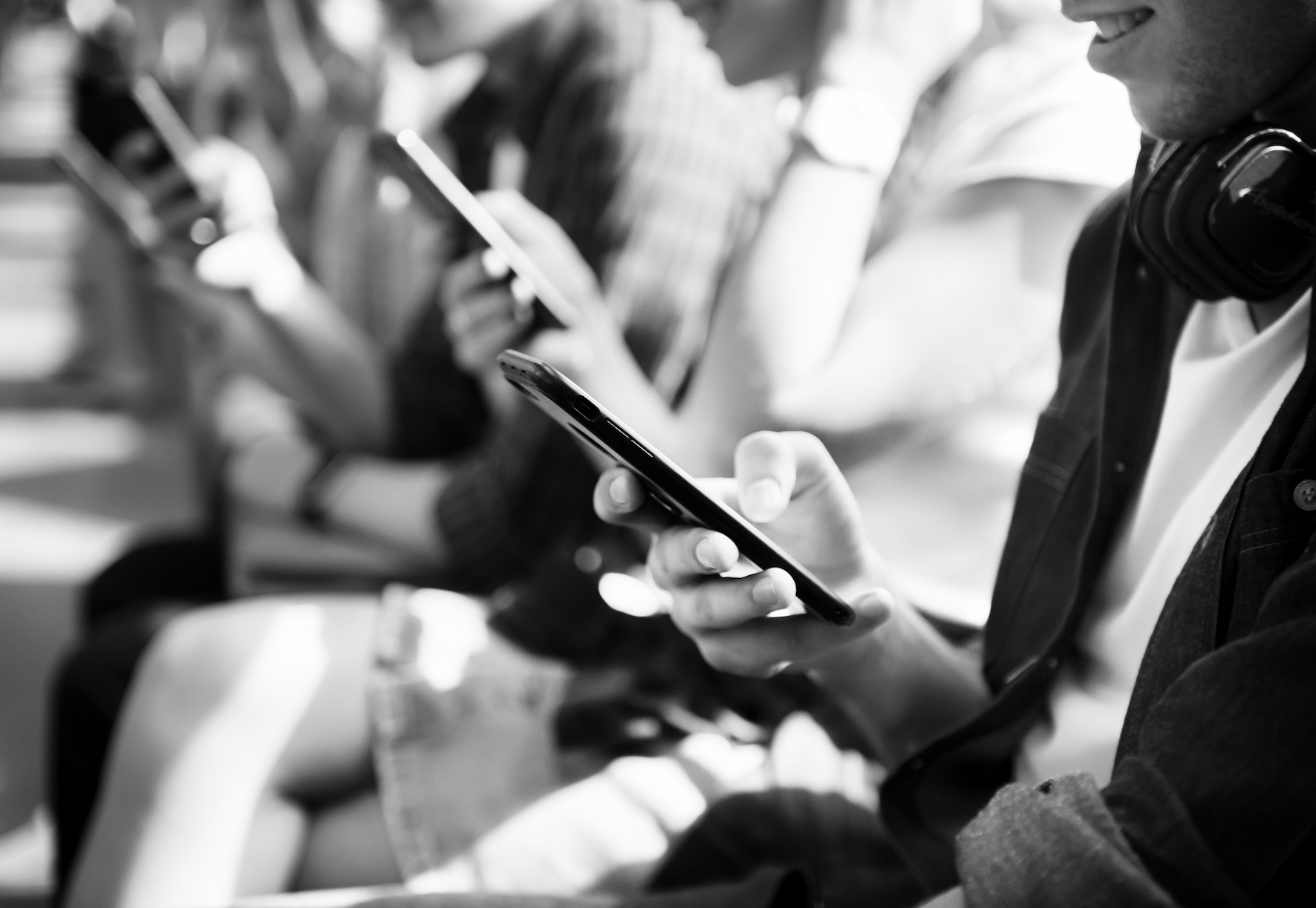The closure of educational institutions because of the pandemic has affected nearly 70% of students worldwide. This means more than 1.2 billion students in both schools and universities.
One of the greatest challenges posed by this crisis is to ensure that these new distance learning processes are fair. The digital gap has been accentuated, especially for the most vulnerable populations, who do not have access to the Internet or electronic devices, to be able to continue their education process. School closures have heightened inequalities in education and affected the most vulnerable. UNESCO estimates that at least 500 million children and young people worldwide are at risk of exclusion from education due to lack of Internet access. Some 56 million students live in regions without mobile coverage, almost half of them in Africa.
Several initiatives and organisations are working to ensure that all students can continue their distance learning process and successfully complete the academic year. Investment in remote learning establishes other approaches and the development of more open and flexible education systems.
It is in this context that the Global Education Coalition was born. This is a worldwide alliance launched by UNESCO, involving more than 100 partners, including international organisations, private companies, foundations, NGOs and the media. The main objective of this alliance is to seek inclusive learning opportunities for learners of all ages and places during the period of lockdown, thus promoting inclusion and fairness.
Institutions such as the Khan Academy, the Organisation for Economic Cooperation and Development (OECD), the United Nations Refugee Agency (UNHCR), the United Nations Children’s Fund (UNICEF), Microsoft, Google, Facebook, media such as the BBC with a programme for broadcasting educational content, and ourselves, at the ProFuturo Foundation, have joined this initiative.
This global coalition for education is an open partnership in which partners contribute to the education process remotely, offering free-of-charge solutions, tools and services for students to continue learning from home. It focuses on working according to the specific needs of each country, analysing the context and the solutions proposed. The coalition process entails the following steps:
- To promote and mobilise. To locate and collect all necessary resources to respond to a need.
- To propose impactful measures that reach students in any region, as the objective is to promote fairness and to reach the most disadvantaged.
- To bring together coalition members to come up with effective and immediate strategies and solutions.
- To develop free, safe and equitable technological solutions through the use of traditional media such as radio and television, to reach those who do not have electronic devices and enable them to continue their education at a distance. And, at the same time, to provide digital tools to teachers, parents and students so that they can continue their learning process remotely.
In order to respond to and mitigate the negative impact of lockdowns on the educational development of the most vulnerable communities, UNESCO has worked with Ministries in affected countries to guarantee learning through various channels. The effort began with the creation of the global coalition to help each country improve distance learning processes and reach the communities most at risk of exclusion. Inclusive distance learning solutions were disseminated according to the context of each region, for those with technology and Internet access and for those without it. Webinars are offered to all those involved in improving and promoting inclusive education. This is a way to pool information on the work being done in each of the countries. At the same time, and as an ideal complement, various thematic workshops for knowledge exchange have been conducted.
Among all the initiatives, the importance of the solutions proposed to combat the lack of Internet connection by students cannot be overstated. This is why the major mobile phone operators, which are part of UNESCO’s Global Education Coalition, have offered free access to online educational resources for students in virtually all regions of the world affected by school closures. In Sub-Saharan Africa, Orange offers free access to accredited learning platforms in Burkina Faso, Guinea, Mali and the Democratic Republic of Congo. This initiative has also been implemented in countries such as Egypt, Jordan, Morocco and Tunisia, where a free Internet connection is provided for all educational content.
In addition, Vodafone has offered a free SIM card to around 80,000 students for unlimited data access to all educational platforms covered by UNESCO. Digital learning resources have been selected so that governments, schools, teachers, parents and students can continue with their training at a distance. Among the distance learning solutions, UNESCO has also posted on its website a list of platforms with resources for teachers, parents and students. These are organised and classified by category:
- Resources to provide psychosocial support. Lockdown has increased episodes of stress for teachers, parents and students alike. To alleviate these emotional states, guidelines have been compiled to protect and improve mental health and psychosocial well-being. The World Health Organization (WHO) has provided psychosocial guidance.
- Remote learning management. Teachers have used various platforms to implement remote training. These include Edmodo, Edraak, Google Classroom, Moodle, Schoology, etc.
- Platforms compatible with basic mobile phones. These are basic applications that can be used offline. Some of the most notable such apps are Cell-Ed, Eneza Education, Funzi, KaiOS and Ubongo.
- Offline platforms. These applications allow learning to continue in regions without Internet connectivity: Kolibri, Rumie and Ustad Mobile.
- MOOC courses. MOOC encompasses all the mass platforms for open-source online courses. These include Alison, Canvas, EdX, Future Learn, TED-Ed Earth School, Udemy, etc.
- Self-directed or autonomous learning. This comprises those applications that incorporate pedagogical materials and open educational resources so that students can continue learning at a distance. These include: ABRA, Discovery Education, Duolingo, Khan Academy, LabXchange, Madrasa, One Course, Siyavula, etc.
- Mobile reading applications. These include storybooks in 189 African languages; books in Spanish for teachers and students through the Latin American Institute for the Education Community’s Digital Library; the Global Digital Library which offers digital stories and books accessible through mobile devices in 43 languages; a reading room with resources to develop literacy skills. In addition, universal reading platforms such as StoryWeaver and Worldreader.
- Videoconferencing tools. Direct communication between teachers and students has been a key factor throughout the lockdown period. And it was made possible through tools such as Skype, WhatsApp, Zoom, WeChat Work, etc.
- Tools for creating digital content. All the tools that have allowed teachers to build their own materials to continue working with students, the academic content proposed for the school year, have also been compiled. These include: Buncee, EdPuzzle, EduCaixa, Kaltura, Thinglink, Trello, etc.
As a member of the coalition created by UNESCO, the ProFuturo Foundation has contributed by offering its digital learning platform to the entire education community, making available more than 160 courses and 2,800 training hours in different languages, so that teachers and students can continue with the distance learning process. Under the hashtag #SeeYouInDigital it managed to share the initiative in 38 countries in Latin America, the Caribbean, Africa and Asia. As part of its core mission, it has managed to bring its programme even closer to the most vulnerable regions of the world, promoting fairness and helping to reduce social gaps through educational intervention.
For more information, see the website:



